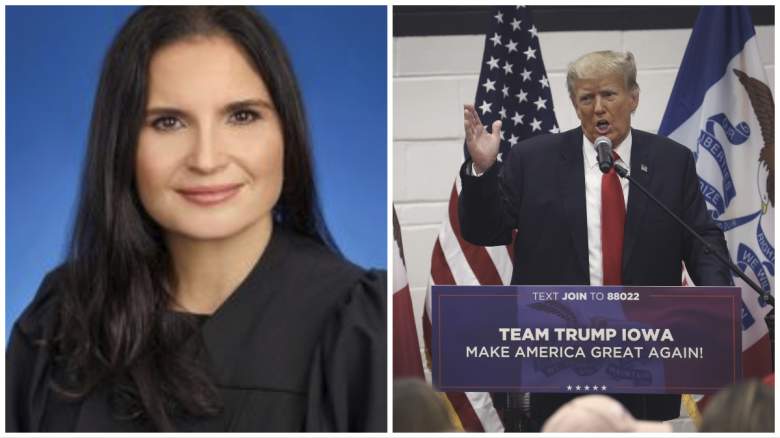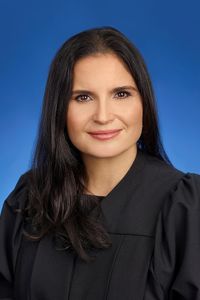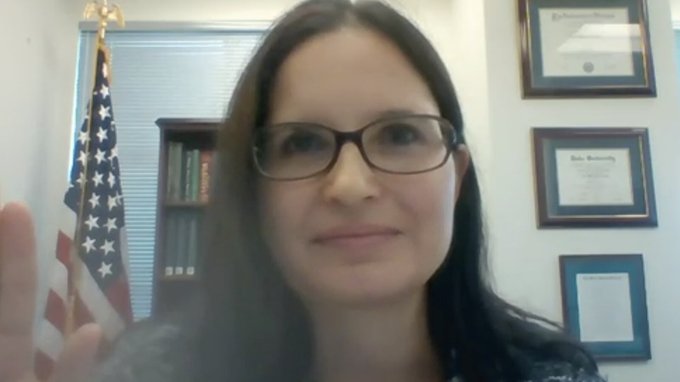
Aileen Cannon is a federal judge and former prosecutor in Florida who was nominated to the bench by former President Donald Trump and who is presiding over his federal classified documents case.
According to the United States District Court for the Southern District of Florida, Judge Aileen M. Cannon works out of the Alto Lee Adams, Sr. United States Courthouse in Fort Pierce, Florida.
Read her answers to questions from the U.S. Senate when she was nominated here and here.
The New York Times reported that the Trump criminal case was randomly assigned to Cannon. According to CNN, Cannon “would have wide latitude to control timing and evidence in the case and be able to vet the Justice Department’s legal theory.” A previous ruling she made in the case, which sided with Trump in his request for a special master to review documents, was overturned by an appellate court, CNN reported.
Since Cannon was assigned to the case, memes have flown on Twitter by critics who say she won’t be fair since Trump appointed her. However, a photo showing a woman at a Trump rally in a Trump hat is not Cannon.
Here’s what you need to know:
1. Aileen Cannon, a Member of the Federalist Society, Was Nominated to the Federal Bench by Then-President Donald Trump in May 2020 After She Was Contacted by the Office of United States Senator Marco Rubio

US District CourtAileen Cannon.
According to Ballotpedia, Aileen Mercedes Cannon was nominated by President Donald Trump to the federal bench on May 21, 2020, and confirmed by the U.S. Senate in a 56-21 vote on November 12, 2020.
Cannon’s questionnaire says that she received an email from the Office of Senator Marco Rubio in 2019 about the judicial position.
You can see a roll call vote from her nomination here.
According to the Ballotpedia, Cannon’s nomination was approved by the Senate Judiciary Committee on a vote of 16-6.
She has been a member of the conservative Federalist Society since 2005, according to her Senate questionnaire. “I joined the Federalist Society in 2005 as a law student at the University of Michigan Law School. I did so because I enjoyed the diversity of legal viewpoints discussed at Federalist Society meetings and events,” Cannon wrote in the questionnaire. “I also found interesting the organization’s discussions about the constitutional separation of powers, the rule of law, and the limited role of the judiciary to say what the law is—not to make the law.”
2. Aileen M. Cannon Served as an Assistant United States Attorney, Prosecuting Narcotics, Fraud, Immigration & Other Criminal Cases
Before her nomination, Cannon “was an assistant United States attorney, serving in the appellate section’s criminal division, in the U.S. Attorney’s Office for the Southern District of Florida from 2013 to 2020,” Ballotpedia reported.
Cannon served as a law clerk for Federal Judge Steven M. Colloton and was in private practice in Washington D.C. from 2009 through 2012, the site reports. She worked for the law firm Gibson, Dunn & Crutcher LLP and Squire Sanders LLP (now Squire Patton Boggs), according to her Senate questionnaire. Cannon also worked as a paralegal specialist for the U.S. Department of Justice Civil Rights Division, Criminal Section from 2003 through 2005, it says.
Her Senate questionnaire says she cited a criminal case, United States vs. Gibbs, as one of her most significant cases. She “authored the government’s brief on appeal and presented oral argument before the U.S. Court of Appeals for the Eleventh Circuit,” the document says.
Cannon told the Senate: “The United States took the position that, based on the evidentiary record developed at the suppression hearing, the district court clearly erred by crediting the testimony of the defendant’s two relatives over the consistent testimony of the two detectives on the sole issue whether the detectives drew their weapons and issued forcible commands as they approached the stopped car.”
Cannon said she did not believe that police officers’ testimony should be given more weight simply because they are officers.
Asked about Roe v. Wade, she said that district courts must adhere to U.S. Supreme Court precedent, the questionnaire says. She said in the questionnaire that she was an “originalist,” writing, “Yes. I understand originalism to be a judicial philosophy that interprets the text of a given legal provision based on the ordinary public meaning of the words as understood at the time of ratification or enactment.”
She declined to discuss many hot-button issue, including voter fraud, writing, “It is my understanding that the issue of in-person voter fraud has been and continues to be a matter of public debate and has been and will continue to be the subject of pending or impending litigation in federal courts. For that reason, it would be improper for me to discuss any personal views that I may have on that issue.”
Asked which groups she has belonged to, she listed Delta Delta Delta Fraternity and the Moorings Yacht & Country Club, among others. She also listed a number of awards she has received.
Under writings, she listed legal articles, including one about the dismissal of fraud charges in a securities case, and a Spanish-language story about tomatoes reducing tumors from 2002.
She listed a number of articles for the El Nuevo Herald that year about a variety of topics, from prenatal yoga, to the musical heritage of Puerto Rico. She listed no political activities. She wrote for El Nuevo while spending a semester in Spain, The Times reported.
As a prosecutor, she wrote that she was an appellate attorney who represented the government in criminal appeals. She handled 41 cases prosecuting defendants for firearms, narcotics, fraud and immigration cases while assigned to major crimes.
She authored 51 appellate briefs. In private practice, the “majority of my work consisted of representing individuals and entities in government investigations and securities enforcement and regulatory proceedings,” she wrote in the questionnaire. One prosecution she handled on appeal involved a man convicted in a large-scale Ponzi scheme, the questionnaire says.
The New York Times reported that Cannon “had limited trial experience because she focused on appellate work” and was not a well-known attorney before the Trump case.
3. Aileen Mercedes Cannon, Who Was Born in Cali, Colombia, Is Married to a Restaurant Executive Who Works for Celebrity Chef Bobby Flay’s Burger Chain

Bobby\’s BurgersJosh Lorence
According to FJC.gov, Cannon was born in 1981 in Cali, Colombia.
She received a bachelor’s degree from Duke University in 2003, and her law degree from the University of Michigan Law School in 2007, FJC.gov wrote.
She went to Thurgood Marshall Academy in Washington DC to read and tutor young children.
A story on her wedding in The Knot says that Cannon, then a 28-year-old attorney, received a proposal from Josh Lorence, her boyfriend of five years, while they were on vacation in Athens. The story described Lorence as a 27-year-old restaurant manager at the time.
The story says he became distracted during the proposal by a “huge turtle” that walked past. They were married in a “traditional wedding” in Coconut Grove, Florida, the article says.
Lorence is an executive for Bobby’s Burgers, which is Bobby Flay’s restaurant chain, the chain’s website says. They have two children, The Times reported. Bobby’s Burgers website described Lorence as an “experienced restaurant operations executive with a demonstrated record of success leading and growing start-up and established quick-service and fast casual brands.”
At her Judiciary Committee hearing, she said that her maternal grandparents “were forced to leave everything they had. They taught me always to be thankful for this country and to cherish our constitutional democracy,” she said, according to The Times.
According to The Times, she grew up in Miami. Her mother Mercedes Cubas had fled Cuba “as a young girl after the 1959 Communist revolution,” and the family of her father, Michael Cannon, had roots in Indiana.
She graduated from a private school in Coconut Grove, Florida, where she played water polo and was considered “popular and studious,” the Times reported.
Alejandro Miyar, a lawyer who knew Cannon in school and worked for the Obama administration, wrote a letter supporting her nomination that called her “personable and trustworthy, a genuinely caring person,” the Times reported.
4. Judge Aileen Cannon’s Previous Ruling Granting Trump’s Request for a Special Master Was Overturned by a Highly Critical Conservative Panel of Appellate Judges
According to The New York Times, Cannon has already made a controversial ruling in the Trump case when she granted his request for a special master to review materials seized from Mar-a-Lago in the investigation.
The Times described the decision as the “extraordinary and unusually broad decision, which could delay the criminal investigation,” writing that it “drew scrutiny from experts who questioned her legal reasoning and criticized some of the language in her opinion about what rights a former president is entitled to.”
Trump’s former Attorney General Bill Barr told the Times he believed Cannon’s decision was wrong. The conservative panel of 11th U.S. Circuit Court of Appeals judges overturned her decision in that case, criticizing it in strong terms. The Times reported that numerous legal experts criticized Cannon’s ruling.
“The law is clear,” the appeals court wrote. “We cannot write a rule that allows any subject of a search warrant to block government investigations after the execution of the warrant. Nor can we write a rule that allows only former presidents to do so.”
The court also wrote that Cannon’s decision would mark a “radical reordering of our caselaw limiting the federal courts’ involvement in criminal investigations” and that “both would violate bedrock separation-of-powers limitations.”
5. Aileen Cannon Was Described by a Defense Attorney as a ‘Freethinker’ Who Sometimes Sides Against the Government

GettyDonald Trump.
Cannon was listed as qualified by a substantial majority and well-qualified by a minority by the American Bar Association in 2020.
Valentin Rodriguez Jr., a defense lawyer in Florida who has squared off against Cannon when she was a prosecutor, told The New York Times she was “thorough, meticulous and often willing to rule against the government.”
“The general feeling that I’ve gotten from her is, ‘I don’t buy everything the government has to tell me,’” Rodriguez told The Times. “You can’t expect that if you and the government have some sort of agreement, over sentencing or a plea, that that’s necessarily going to convince. In that sense, you could call her something of a freethinker.”
READ NEXT: The Trump Prosecutor Jack Smith’s Wife Katy Chevigny.

